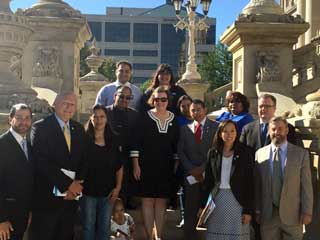News Release: MCC Advocates for Driver License Access for Undocumented Persons

FOR IMMEDIATE RELEASE
September 20, 2016
(Lansing, Mich.) — Denying an undocumented resident of the state access to a driver’s license not only harms the dignity of that person but also makes life’s daily routines excessively difficult, Michigan Catholic Conference Vice President for Public Policy Tom Hickson said today during a press event on the steps of the State Capitol.
Legislation to be introduced this week by Representative Stephanie Chang (D-Detroit) and Representative Harvey Santana (D-Detroit) would require the Michigan Department of State to issue an operator’s license to an applicant who is unable to submit sufficient documents to verify his or her identity and legal presence in the United States, provided specific criteria are met and documents that prove residency can be made available.
Below are prepared remarks Hickson delivered at today’s event. The legislation discussed will be assigned to a committee once it is introduced.
Since our founding, the Michigan Catholic Conference has taken pride in advocating for the poor, the vulnerable, and those who cannot speak for themselves. In that regard, we advocate for vulnerable individuals ranging from unborn children, to the elderly and at every stage of life in between.
We are very grateful to both Representatives Chang and Santana for bringing the issue of driver licenses for undocumented residents to the public forum.
Transportation is vital to nearly every aspect of life, and to have good transportation access, you need a driver’s license. The inability to obtain a license makes life’s most basic functions extremely difficult. Most of us take for granted life’s routine tasks, such as driving to work, going to a doctor’s appointment, taking a child to school, going to church, or picking up groceries.
For many of residents of this state, these types of tasks can be a great risk. I’ll give you a few examples:
- The factory worker trying to get to work to earn a living and pay taxes.
- The young couple who is trying to get to their child to a school.
- Picking up a child from day care or taking one to a doctor.
All of these situations require a driver’s license.
Prohibiting individuals from gaining access to a driver’s license robs them not only of their human dignity but it also hurts the community.
A driver’s license allows a person to work, to take care of their children, to buy necessary goods and to contribute to our tax revenue. Those that do not have a driver’s license must find other means of transportation, which often is not reliable. For those undocumented individuals that choose to drive, they do so at a great risk to themselves and others. As these individuals will not have access to driver’s training, they could pose a greater traffic safety threat than drivers who do have access to training.
For these reasons, the Michigan Catholic Conference is proud to stand here today to discuss this issue and looks forward to a robust discussion on this important human dignity issue in the Michigan Legislature.
Michigan Catholic Conference is the official public policy voice of the Catholic Church in this state.
-- 30 --
